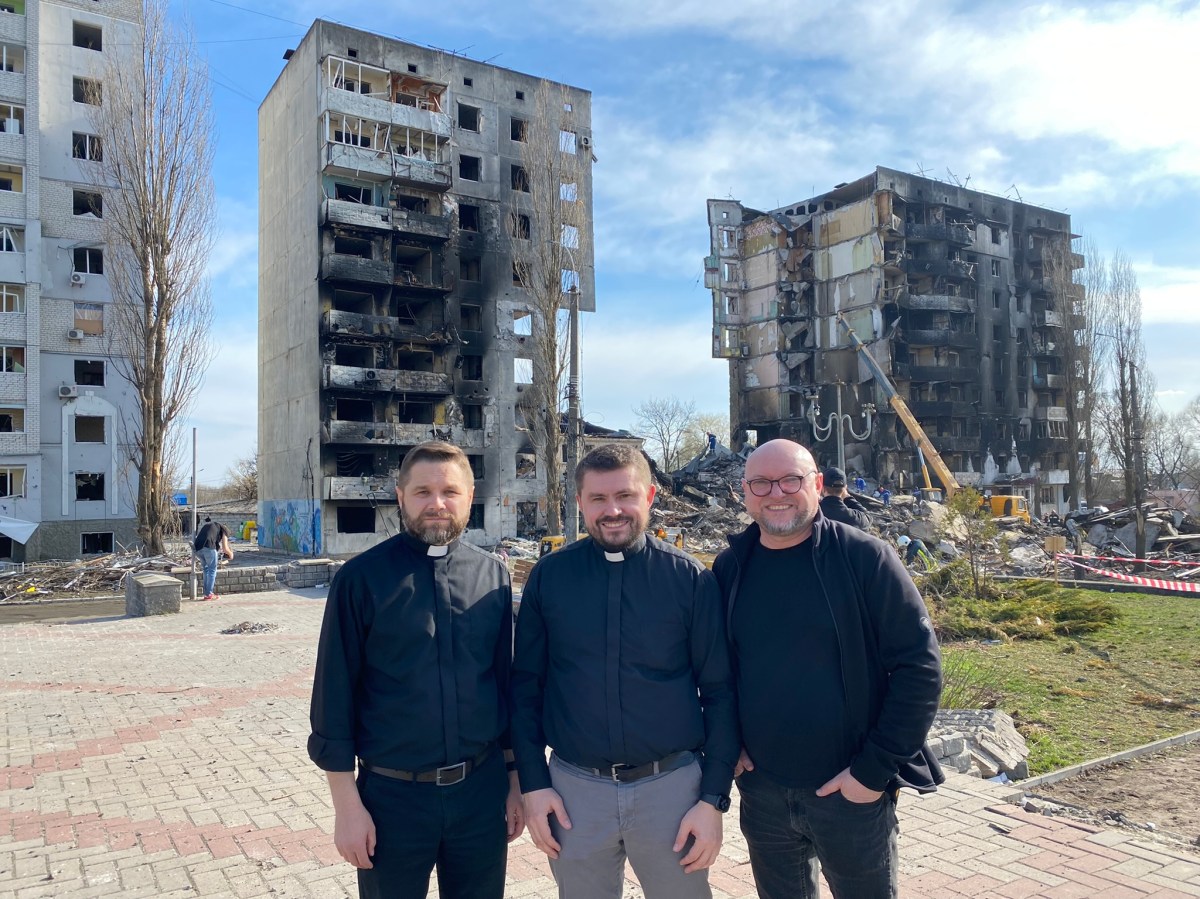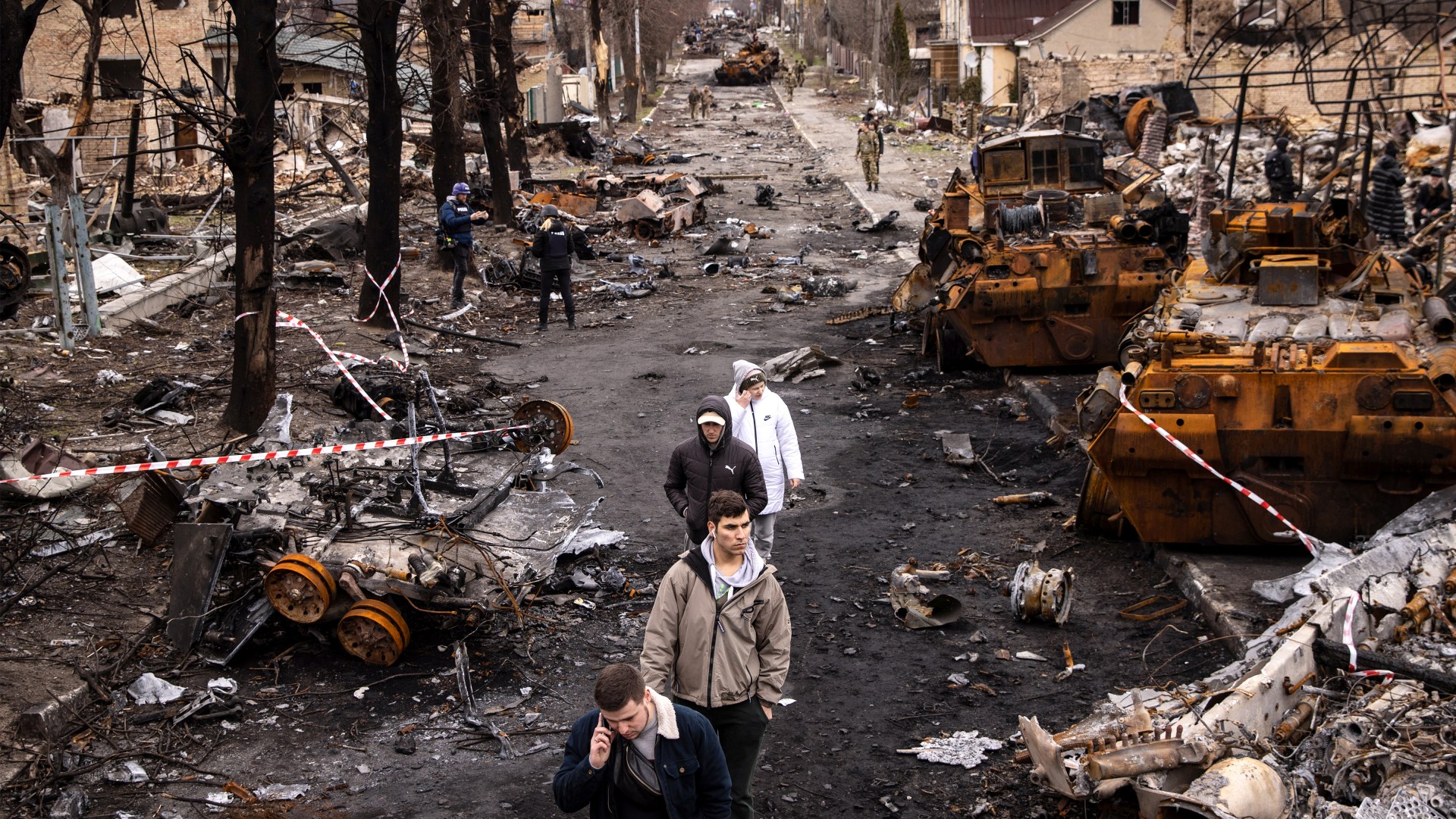The atrocities are shocking. Ukrainian authorities have said 410 civilians were killed in the suburbs of Kyiv, discovered after the Russian army withdrew from its positions. At least two were found with their hands bound; several were shot in the head.
Many bodies were burned.
One resident said the occupiers were polite, and shared their meal rations. But others told of ransacked apartments; one was tied to a pole and beaten. Soldiers even shot a cyclist, who had dismounted and turned a corner on foot.
It could have been Ivan Rusyn.
President of Ukrainian Evangelical Theological Seminary (UETS), he had been coordinating aid from a safe house in Kyiv. But riding his bicycle into Russian-controlled Bucha to deliver medicine to a neighbor, he became an eyewitness to the atrocities.
Russia has called the images fake; satellite evidence contradicts.
Christianity Today
interviewed Rusyn to hear his firsthand report. He spoke about the spiritual impact, becoming a more authentic church, and how evangelicals have been helping the reclaimed suburbs—where he lived the past eight years:
Tell me about your neighborhood.
If you look at Bucha on Google Maps, I live in one of the five apartment blocs opposite Toscana Grill. It is an expensive restaurant, but sometimes I have eaten there. I run in the municipal park nearly every day, and with friends on Saturday. The seminary in Kyiv is six miles away, and it would take me 25 minutes to drive there, with traffic.
I noticed Google now says it will take an hour and a half.
The bridge was destroyed on the second day of the war. Russian helicopters and soldiers landed first at the Hostomel airport, three miles from our home. There was heavy combat, and I took shelter in my basement for the next five days. Then I left to the seminary, following that Google Maps route to skirt around Kyiv to the northeast. After two days we evacuated, and I found my way to a safe house in the city.
Now when we bring food and provisions into Bucha, Irpin, and Hostomel, we see many destroyed Russian tanks. The bridge is still out, but we can navigate it carefully with minibuses. It is dangerous, but if you go slow the journey now takes about one hour.
When did you return?
Four days ago (April 3). We were escorted by police because we had a long line of buses full of provisions, and to evacuate citizens. It was the same day that President (Volodymyr) Zelensky was in Bucha.
But I went once even before that, by bicycle.
My neighbors were sheltering in the basement, there was no way to contact them, and an evacuation route was being prepared. They also needed medicine. Irpin was under Ukrainian control at the time, so I went first to the military checkpoints there, but they didn’t permit me to go into Russian-occupied Bucha.
So I went to the nearby shallow stream, used my bike and a small tree to balance through the water. I saw dead bodies—civilians and soldiers. I saw people carrying children on their shoulders with their hands raised. I saw elderly people trying to find a way out.
And when I saw Russian soldiers, I had to hide. At one point I felt stuck in a bombed-out building, afraid I would have to spend the night. But I moved along small streets as much as possible, avoiding the main roads.
When I arrived, it was hard for my neighbors to leave, they were so afraid.

What was it like when you returned in peace?
The first time, my apartment was without electricity but otherwise alright. The second time, the doors were broken into. I was robbed, and there was a Russian soldier’s coat left behind. But they didn’t just steal things, they smashed the TV, my computer monitor, and other appliances.
My neighbor, Nina Petrova, told me Russian soldiers came to her apartment and put a gun to her head, forcing her to show them all her valuables. Every apartment has been broken into. In some they even put a knife through the family photos.
I had an interesting psychological reaction, that others have also mentioned. Because an enemy—a killer—was in my apartment, I felt like it is not my own. I don’t care about things that I lost; I have peace in my heart. But the hardest thing is to come to terms with the Russian soldiers walking around my home.
What is it like to see a body on the street?
The last thing you think about is taking photos. And you don’t stop to examine who it is. But I found that in such a stressful situation I could mobilize myself to act. When I come back to our base, when I see the photos and read reports—I don’t know if it is okay to say this—but many of us are crying every evening.
But when I return to Bucha to help, I’m okay.
Two days ago, we visited Hostomel, and everything was destroyed. Then people started showing up, one by one, dirty. One lady came to me, and I noticed her hands. She said they are cooking over firewood. Her husband was killed, and she buried him right at the entrance to her apartment.
And then she hugged my colleague.
I heard at least 15 stories of people who told me they buried their loved ones. Yesterday we evacuated two ladies; one buried her husband in the yard. Another, very old, had been staying in an apartment without windows, very cold, no water, no electricity, nothing. A woman had been bringing her food every day and asked us if we could help her.
There are thousands of people like this. Younger people are more resourceful, able to evacuate. But old people have nowhere to go. They told me they went through hell.

Are there any evangelical casualties?
One of our graduates has been arrested, and we still have no idea where he is. But his son-in-law, taken at the same time, was found in a mass grave in Motyzhyn. Yesterday was the funeral, with a proper burial.
The dean of a seminary was also found dead. He was shot, and his body had been lying on the road for at least a few days, alongside his friend.
These are people we know personally.
In the first days of the war, you said that “God, break the bones of my enemy” has now become as holy as a “Hallelujah.” But now you have seen atrocities firsthand. What has your spiritual journey been like since then?
At that moment I could say it very clearly. But over the past 43 days, it has gone deeper. Our emotions are not as strong. We speak more slowly and quietly. Maybe professionals would say we are wounded psychologically. We try to say we are okay (smiling), but anger and pain are still present, penetrating to the deepest part of our identity.
I don’t know how to express it, even in Ukrainian. It is like being frozen. It is destructive. It is constantly thinking and recalling the suffering you have seen. It remains with you, and I am afraid it will not go away soon.
I still support that statement. My whispered cry to God is to intervene.
How has it affected relations with Russian evangelicals?
This war was not provoked by Ukraine. I don’t pray for Russians. Well, rarely. Over the past several years we had a pattern with them. We tried to adapt. You don’t understand Ukrainian? Alright, we will speak Russian, no problem. You don’t like the reports from the Donbas? Okay, we will be quiet.
But why do we have to be quiet?
Now we are hearing the same voices again. The situation is not clear. The photos you show us are hurtful. But why should we be quiet? We feel like they are trying to teach us how to forgive, but they don’t want to hear our voice. Only a few people reached out to me.
I understand Russian Christians will not go to Red Square to protest, and no one requires them to. But they could send us a message, even if encrypted: We can’t do anything here in Russia, but we are with you. We are against this war.
What is the impact on seminary education?
We will carry on as best we can. But sometimes I desire to reflect theologically, and other times I don’t want to think theologically at all. But I believe that we will become stronger.
No, not stronger—more authentic.
Of course we have a lot to share. But our authenticity will be expressed in our ability to listen, demonstrating sympathy without any words. My collar helps: People see I am a pastor, and we have red crosses on our buses.
The seminary will be less active in speaking for awhile, but we will serve our society through presence. I have received more hugs from strangers these past 43 days than from all my relatives the past five years.
We are developing a counseling ministry in our psychological department. Trauma is everywhere, and many Christians want to help. They have the best of motives; but with no experience, approaching the wounded will make things worse.
But my Christianity, my theology of mission, is in the process of being reshaped. Every week we are serving communion, experiencing God’s presence and solidarity with strangers and soldiers, in the open air. There are hundreds and thousands of churches actively serving, and evangelical Christianity will become more and more a part of society.
Sometimes you turn away from theology. Have you struggled with God?
I have been a Christian for a long time, involved in theological education for many years. There were times when I had questions for God, and of course I have them now.
Before the war, my wife and I were reading about the Holocaust—Elie Wiesel’s book. We visited museums in Kyiv and the site of the massacre in Babi Yar. This might sound academic, but it is not. I don’t know how to explain it, but sometimes in God’s silence, I hear his voice. This is a very contradictory statement. But in his absence, I feel his presence.
I can tell you honestly, there is no question for me if God exists or not. I once had an epistemological crisis, when I was starting my journey in theology. But amid this war, I never doubt that God exists.
Or that he loves you?
I think yes. I haven’t thought about it that way. Maybe I haven’t had time.
To our students, I explain that God’s actions are often clearer when you look backwards. I believe Ukraine will be a great nation, and a blessing to many others. Our unity, solidarity, and generosity—with strangers we never knew—is amazing. I hope that we will be able to see his logic later, but right now the price is very high.
The Russian Federation is destroying our nation. We don’t care about the buildings. But they consider our values a threat. I ask the global community to continue supporting Ukraine, not only with humanitarian assistance but also with all political and military help possible.
We are fighting a giant.
I want to say I see God’s hand at work. Here in the safe house, I can. But when I go back to Bucha tomorrow, can I say it to the old woman? Can I tell her that God is working in her life? Theologically, I believe he is. But in front of such suffering, I lack the strength to communicate it.











